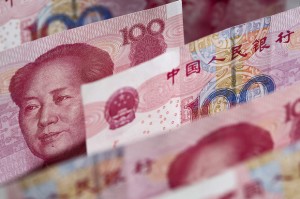On December 7th, 2015, China’s Central Bank reported that foreign exchange reserves had fallen to $3.4 Trillion, the lowest level since 2013. “Today’s data suggest that capital outflows picked up sharply last month,” says Julian Evans-Pritchard, chief China economist for research firm Capital Economics. Money has been steadily flowing out of the country since August of 2015, when China devalued its currency. This surprise devaluation led critics to believe that China’s economy was worse off than most people realized, resulting in an outflow of currency.
most people realized, resulting in an outflow of currency.
China has been trying to offset this outflow of currency by using its foreign exchange reserves to buy back the Yuan.
China has already seen an outflow of over $500 Billion this year, despite the fact that China limits the amount of money its citizens can move outside of the country to $50,000 per year. As a result of this significant outflow, China has further restricted the amount its citizens can move out of the country even further in hopes to limit the outflow of currency occurring in China.
Site: http://money.cnn.com/2015/12/07/news/economy/china-foreign-exchange-reserves-shrinking/
After the major stock crash earlier this year, the Chinese financial markets have also been struggling. This has led to trouble receiving loans from banks especially as a small business owner. While I have generally erred [sic: aired] on the side of China is not as bad as the media has recently published, some of the monetary struggles do seem somewhat troubling. I’m interested to see how the nation continues to adapt into the future.
I think that some of the information we learned from Leland Miller is useful to apply in observation of the Chinese Markets. With the government controlling the ability of shareholders to sell securities at certain point, the idea of a completely free market is a novel thought in the country. Considering this reality, it is really hard to observe the markets and use that as an indicator of the success of a country’s industry, as is possible with the S&P and Dow Indices in the United States.
As noted in earlier blog posts on the RMB exchange rate, portfolios in China are poorly diversified – and don’t put all your eggs in one basket is the #1 rule of investing. Buying foreign assets is a way to improve a portfolio with assets whose price changes potentially won’t correlate with domestic prices and hence aid diversification. It’s not just individuals, it’s all sorts of firms with financial assets, including in particular insurance companies.